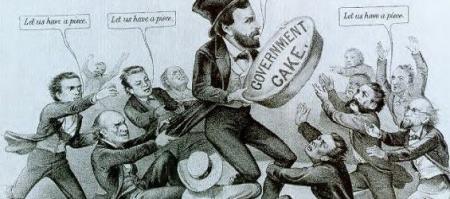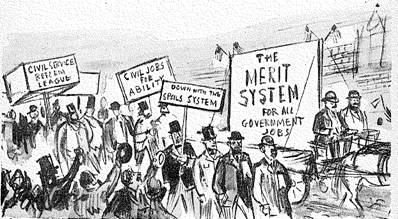Michael Lewis traces the ‘gutting of the civil service’ under Trump
Oct 8, 2018 6:25 PM EDT
Bestselling author Michael Lewis says the idea that civil servants are “lazy or stupid or dead weight on the society is…the most sinister idea alive in this country right now.” In his new book, “The Fifth Risk,” Lewis examines how the Trump administration has been staffing the federal government, and its “ignorance of the mission.” Lewis sits down with William Brangham for a conversation.
Judy Woodruff:
As we have been reporting, addressing enormous global challenges like climate change require more than just individual action. They require the leadership of active, engaged governments.
In his new book, “The Fifth Risk,” bestselling author Michael Lewis reports on the Trump administration and its approach to staffing the federal government.
William is back with the latest installment of our “NewsHour” Bookshelf.
He began by asking Michael Lewis to explain the book’s title.
Michael Lewis:
It’s the risk you’re not imagining. It’s the thing you’re not thinking about when you’re worried about whatever you’re worried about.
And the beginning of the story is really seeing the federal government as a portfolio of risks that are being managed. Most of — most of them, we aren’t even thinking about, things like the risk that some nuclear bomb is going to go off when it shouldn’t go off, managed out of the Department Energy, or that we won’t have an accurate picture of the society, managed out of the Department of Commerce.
It collects all the statistics about the society. I mean, you move across the government, it’s breathtaking how many mission-critical things there are, and how it’s being done in spite of this vague hostility the society has to its own government.
William Brangham:
Your reporting really covers the period after Trump is clearly going to be the president and the transition that goes on when one administration switches to the next.
How would you characterize, broadly speaking, how that transition happened and what occurred?
Michael Lewis:
So, there’s what’s supposed to happen, and there’s what happened.
What is supposed to happen is that the outgoing administration spends nine months and a thousand people’s time building briefing books across the administration. So, the Obama administration did this. And the idea was, the day after the election, whoever won would send hundreds of people into the government to get the briefings.
And the Trump administration didn’t show up. They never bothered to learn what these agencies are doing.
William Brangham:
The book has so many fascinating vignettes of people who work within these different federal agencies.
And I wonder if there’s one story that stands out to you that’s emblematic of this larger issue that you’re talking about.
Michael Lewis:
Well, the larger issue of the ignorance — the problem of ignorance of the mission, and, as a result, putting the wrong person in.
I mean, there are hundreds of examples, but I mean, I think one that is easily described is, inside the Department of Agriculture, there is a chief scientist. And this person is responsible for distributing $3 billion in research grants every year.
Now, this is going to agricultural research, most of it, one way or another, now associated with climate change. it’s how we’re going to — how we’re going to continue to grow food and graze sheep and milk cows in different — in a different climate. And it’s a serious issue. It’s the planning for the — the food supply of 50 years from now.
The person who was doing that was a very distinguished research scientist in agriculture named Cathie Woteki. She’s a world-class authority on the subject of agricultural science.
Trump replaced her with a right-wing talk show radio host from Iowa who happened to have supported him in the election who had no science background at all.
That kind of thing, taking people who really know something, and replacing them with people who are just like loyalists, who have absolutely no idea what the mission is, is a theme that runs right through the administration.
William Brangham:
Does the mission suffer? I mean, I think obviously, you could look at that kind of a transition and say, that seems a drastic shift in priority.
But these bureaucracies largely have a career staff that are there largely permanently. I mean, doesn’t — doesn’t that staff keep the mission going for the most part?
Michael Lewis:
So of the top 6,000 career civil servants in the federal work force, 20 percent of them quit or were fired the first year of the Trump administration.
So, already, there’s a — you can see a gutting of the civil service. And the idea that these people are lazy or stupid or dead weight on the society is — I think it’s the most sinister idea alive in this country right now. I really do.
And I think — and it’s because they are — they’re very mission-driven people. They’re very knowledgeable people. What they aren’t is money people. And…
William Brangham:
Meaning they’re not in money for themselves.
Michael Lewis:
Yes, that’s right. You don’t take these jobs to be famous — rich and famous. You take these jobs because you really care about the thing.
And they’re the government. And without those people, this place collapses.
William Brangham:
This place being this society.
Michael Lewis:
The society.
It’s not like the government is a tool that we might use to address the biggest problems we have. It’s the only tool for most of the biggest problem. You’re going to deal with climate change, that’s going to be from the government.
If you deal — anything having to do with science and technology, all the basic research, the very basic research is done with government — through the government, because if it’s not going to pay out in the next 10 to 15 years, industry doesn’t want to have anything to do with it.
The future is driven by what the government does. And it has been in this country forever. I mean, you don’t get the Internet without the government. You don’t get the iPhone without the government. You don’t get GPS without the government.
We are drastically cheating the future when we beat the government, the way we treat it. It’s not just Trump. I mean, we have been doing this here for several decades, this — playing with the idea that the government’s the problem, not the solution. He is just the ultimate expression of the problem.
And I think if it’s like there is this exquisitely important machine that we have allowed, through our own neglect, to accumulate rust over the decades. And now he’s come in with a sledgehammer. And, yes, we’re going to play a real price if we don’t pay attention.
In the last third of the book, you really talk about the centrality of government data and how important that is.
And there’s a few passages where you list a lot of ways in which the Trump administration has been scrubbing its Web sites of data. The USDA was removing reports of farm animals being abused, the Consumer Financial Protection Bureau removing reports of financial abuse, FEMA removing data about electricity and water in Puerto Rico after the hurricane.
What is behind that?
Michael Lewis:
All the climate change data across the…
William Brangham:
Right, at the Department of Energy.
Michael Lewis:
There is a threat, anyway, to the weather data being accessible.
It is not ideological. It’s been driven by narrow financial interests. Someone…
William Brangham:
Financial interests?
Michael Lewis:
Someone has a business that is going to be more profitable if this information is not available.
And so it’s ranchers who want to be able to abuse animals, or it’s a — it’s a weather company that doesn’t want the weather data publicly accessible, because they want to be able to sell it to people.
William Brangham:
After talking with all of these different officials working within these crucial agencies, what is the thing that scares you the most? What keeps you up?
Michael Lewis:
It’s a broad thing. And the broad thing is the fantastic myopia of this moment.
We’re going to look back and say there were many — unless we drastically shift course — look back and say there were many moments where we cheated the future by the way we behaved in the present.
And I think that’s — that’s been true for a while, but I think it’s really true right now.
William Brangham:
The book is “The Fifth Risk.”
Michael Lewis, thank you so much.
Michael Lewis:
Thanks for having me.
In: npr
Read also:
Michael Lewis Wonders Who’s Really Running the Government
‘The Fifth Risk’ Paints A Portrait Of A Government Led By The Uninterested






